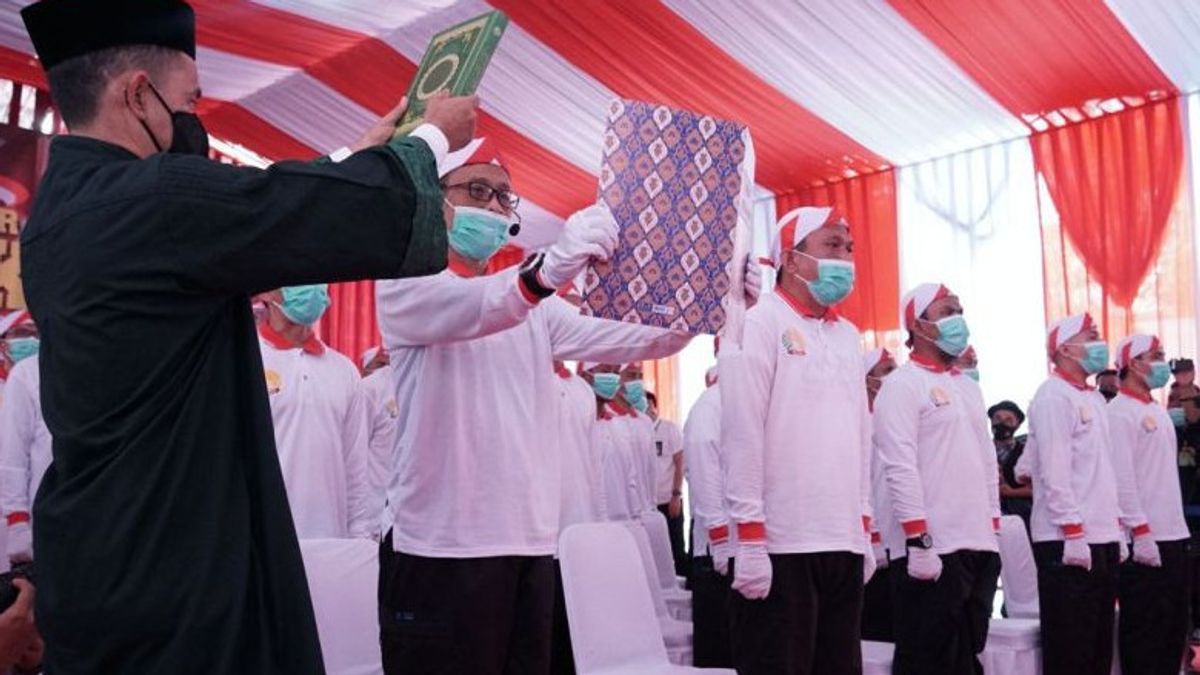JAKARTA - A total of 40 terrorism convicts (convicts) at the Class IIA Narcotics Correctional Institution and Class II A Special Prison, Gunungsindur, Bogor, have pledged allegiance to the Unitary State of the Republic of Indonesia (NKRI) as a form of deradicalization program.
This deradicalization program was carried out by the National Counterterrorism Agency (BNPT), Special Detachment (Densus) 88/Anti-Terror Police and the Directorate General of Corrections (Ditjen PAS) of the Ministry of Law and Human Rights which took place at Class II A Narcotics Prison, Bogor Regency.
"So we are grateful, of course, that the synergistic program among ministries and institutions in the efforts of this program, especially in prisons, has had an encouraging impact. The active role of relevant institutions in the deradicalization program is expected to optimize the results obtained for the sake of a harmonious and tolerant Indonesia," said Head of BNPT Komjen Boy Rafli Amar as reported by ANTARA, Monday, August 15.
According to him, what these 40 convicts did is a process carried out in the process of coaching in prisons from related parties.
He said the coaching process was not only carried out in the Gunung Sindur prison, but in a number of other prisons, deradicalization programs were also implemented, such as in Nusakambangan, where there are several prisons in which there are inmates with backgrounds in terrorism cases.
"So this process is pursued every year and this is an indicator that efforts to rebuild the spirit of love for the country among the inmates can at least be seen in the process we are both witnessing today," said the former Papuan Police Chief.
The head of the BNPT explained that the ideology of terrorism so far has invited individuals or groups to be hostile to their own country, intolerance and hate towards others.
"Of course this is not the identity of the Indonesian nation and it is not taught in the religion we believe in," he said.
Therefore, he said, the deradicalization program carried out by the inmates itself at least consisted of several kinds of activities such as activities of national insight, religious insight, and psychology.
"Indeed, it cannot be compared as easily as turning the palm of the hand. The process must continue to run continuously. So (guidance) against them (convicts) according to the date of their entry. But in principle, with their status as prisoners, they must be included in the deradicalization program," said Boy Rafli.
The head of BNPT also expressed his gratitude to the relevant parties who have participated in the success of the deradicalization program for terrorism inmates and hopes that the guidance through this deradicalization program will continue continuously.
"We hope that the development through this deradicalization program is sustainable both inside prisons and can continue outside prisons. Let's together reduce the number of terrorism and observe our nation from the bad influences of radical ideas of terrorism, " said the former Banten Police Chief.
Because according to the Head of BNPT, later if the inmates have been released from prison, further training will also be carried out outside the prison. Even some of the ex-terrorism convicts have also carried out MSME activities with guidance from the BNPT and other related parties.
Moreover, currently BNPT has also established five Archipelago Integrated Regions (KTN) in the provinces of Central Java, West Java, East Java, West Nusa Tenggara and Central Sulawesi.
He said, all to accommodate those who have been released from prison with various coaching programs related to entrepreneurship economic problems, then education education issues. Where in this education the ex-convicts of terrorism cases also become extension workers by contracting radicalization in the community.
"So the program after leaving prison will continue when they are in the community. What is important is that we make sure that our friends always think positively for the good of the nation and the country," said the Head of BNPT.
The English, Chinese, Japanese, Arabic, and French versions are automatically generated by the AI. So there may still be inaccuracies in translating, please always see Indonesian as our main language. (system supported by DigitalSiber.id)








